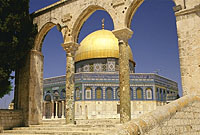Why do many ARAB CHRISTIANS refer to God as “Allah”?
Arabic: الله = Allah
Introduction

Also, see “God” and “Names of God”
“Allah” is the Arabic word for “God” and has been so long before the existence of Islam. Long before the Arabic false prophet Muhammad was born, the name Allah was used by both Jews and Arab Christians to refer to the one true god.
The names “Allah” and “God” are generally interchangeable in Middle Eastern cultures and within the Muslim religion. Some English translations of the Qu’ran (Koran) use the name “God,” others use “Allah.” This sometimes comes as a surprise to Christians who were raised in Western cultures. Many ex-Muslim converts to Christianity commonly refer to God as “Allah.” These converts clearly recognize the major differences in the character and nature of God and His plan as described by the Old and New Testament, in contrast to that of Islamic writings. Although both Christians, Muslims and Jews firmly believe there is only one God, true followers of Jesus Christ (God incarnate) know the vital and wonderful reality of God’s Triune nature—Father, Son and Holy Spirit.
Of course, the word “God” does not actually appear in the original Hebrew or Greek manuscripts of the Bible, accepted as Holy by both Christians and Muslims. “God” is an old English word which developed from an Indo-European word, meaning “that which is invoked,” which is also the ancestor of the German word Gott (meaning: God).
“The name Allah, as the Quran itself is witness, was well known in pre-Islamic Arabia. Indeed, both it and its feminine form, Allat, are found not infrequently among the theophorous names in inscriptions from North Arabia.” —Arthur Jeffrey, Islam: Mohammed and His Religion (New York: Bobbs-Merrill Company, 1975).

The Navigators, a well-known evangelical Christian organization, published the following:
“…It’s interesting to observe that, in rejecting the Athenian’s erroneous concept of God, Paul did not reject the word they used for God, Theos, which was the common Greek word for God.
Some Christians unthinkingly say ‘Allah is not God.’ This is the ultimate blasphemy to Muslims, and furthermore, it is difficult to understand. Allah is the primary Arabic word for God. It means ‘The God.’ There are some minor exceptions. For example, the Bible in some Muslim lands uses a word for God other than Allah (Farsi and Urdu are examples). But for more than five hundred years before Muhammad, the vast majority of Jews and Christians in Arabia called God by the name Allah. How, then, can we say that Allah is an invalid name for God? If it is, to whom have these Jews and Christians been praying?
And what about the 10 to 12 million Arab Christians today? They have been calling God ‘Allah’ in their Bibles, hymns, poems, writings, and worship for over nineteen centuries. What an insult to them when we tell them not to use this word ‘Allah’! Instead of bridging the distance between Muslims and Christians, we widen the gulf of separation between them and us when we promote such a doctrine. Those who still insist that it is blasphemy to refer to God as Allah should also consider that Muhammad’s father was named Abd Allah, ‘God’s servant,’ many years before his son was born or Islam was founded!” —excerpted from Building Bridges by Fouad Accad (Colorado Springs, CO: Navpress), p. 22.

The publishing arm of the Moody Bible Institute published:
“Whenever it is postulated that Christians and Muslims worship the same God, there are some—both Christians and Muslims—who say this is simply untrue. Those who raise objections generally agree that Christians and Muslims worship one God, but will not accept the statement that they worship the same God. Admittedly, this problem is probably more of a Christian problem than it is a Muslim problem. Once a Muslim is ready to acknowledge that God can be known by a name other than Allah (i.e., God, Onyame, etc.), he will generally agree that Christians and Muslims worship ‘the same God.’ At the same time, he will insist, however, that Christians err in ‘associating’ (shirk) others with God. This conclusion grows out of the common misunderstanding among Muslims, based partially on the Quran (5:119), that Christians worship a Trinity of Father, Mother, and Son.
The problem as it confronts Christians is another kind of a problem altogether. It is a question of whether you can say you are worshipping the same God when you have such different understandings of the nature of God. Those who are troubled by this concern say that although Christians and Muslims use the same name for God and many of the same words to describe Him, they are not talking about the same God because Christians are talking about the Triune God, Father, Son and Holy Spirit…” —excerpted from REACHING MUSLIMS FOR CHRIST: A Handbook for Christian Outreach Among Muslims by William J. Saal (Chicago: Moody Press, 1991)—© 1991 Arab World Ministries
Moon-god?
Allah is not an ancient Moon-god, as some have charged. Muslim astronomers precisely studied the Moon’s movements because it was necessary for the Islamic calendar; the crescent moon marks the beginning and end of its months. The same was true in the Babylonian calendar. The Quran, itself, states that the Moon is a creation and sign of God, but not God Himself. Verse 37 of the Surah (Sura) chapter 43 of the Quran specifically states,
“And of His signs are the night and day and the sun and moon. Do not prostrate to the sun or to the moon, but prostrate to Allah, who made them so, if it should be Him that you worship…”
Trinity
To differentiate themselves from Muslims, some Arabic Christians refer to God by the names:
Allāh al-Ab—God, the Father
Allāh al-Ibn—God the Son
Allāh al-Ruh al koudous—God the Holy Spirit
More Information
To learn more about Islam, please see…
[ An Overview for Christians ]
Also see the Islam section of our Effective Evangelism site for far more information and streaming videos
Answering-Islam is a another Christian Web site that compares the god of Islam with the God of the Bible. It provides more in-depth perspectives on the controversy of whether or not it is appropriate to refer to God as Allah.
Compiled and provided by Christian Answers.
Copyright © 2001, 2011, 2017, 2018, 2021, Christian Answers, All Rights Reserved—except as noted on attached “Usage and Copyright” page that grants ChristianAnswers.Net users generous rights for putting this page to work in their homes, personal witnessing, churches and schools.
